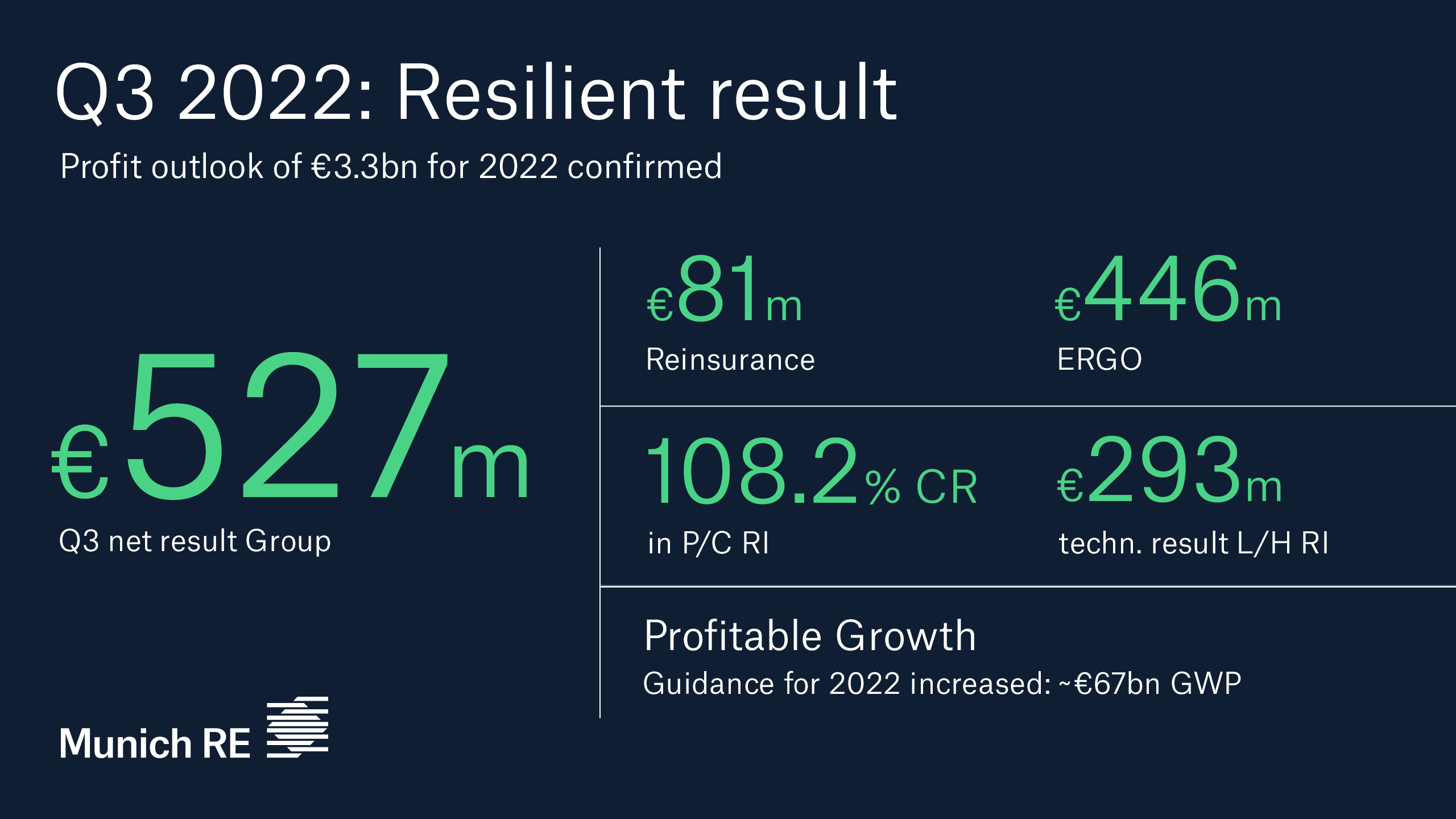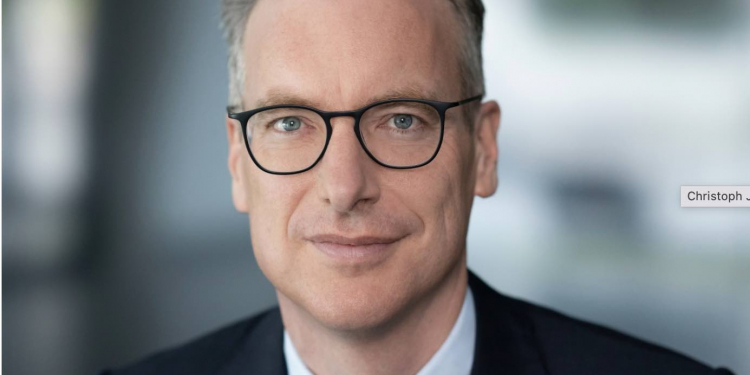
© Munich Re
Summary of Q3 figures
Munich Re achieved a profit of €527m (366m) in Q3 2022, and a total of €1,903m (2,061m) in Q1–3. The quarter was marked by above-average expenditure for natural catastrophes. Munich Re projects losses of around €1.6bn from Hurricane Ian. The operating result fell to –€346m, compared with €204m for the same quarter last year. The other non-operating result amounted to –€5m (–18m). The currency result increased significantly year on year to €846m (242m), in particular owing to exchange gains on account of the US dollar. The effective tax rate was –16.8% (4.7%). Gross premiums written were significantly up year on year by 17.8% to €18,228m (15,480m) in Q3, and rose by 14.0% to €50,910m (44,673m) in Q1–3.
At €21,417m, equity was down from the level at the start of the year (€30,945m), mainly due to a decline in valuation reserves on fixed-interest securities. The latter was attributable to a rise in interest rates that is economically advantageous for insurers. The solvency ratio was approximately 254% (227% as at 31 December 2021), which is above the optimum range (175–220%).
The annualised return on equity (RoE) was 8.5% (6.3%) in Q3 2022, and 10.3% (12.1%) in Q1–3.
The reinsurance field of business contributed €81m (232m) to the consolidated result for Q3 and €1,201m (1,594m) for Q1–3. The decline compared with the same quarter last year is mainly attributable to the expenditure for Hurricane Ian and the lower investment result. The operating result totalled –€687m (13m) in Q3. Gross premiums written were up significantly to €13,712m (11,160m).
Life and health reinsurance business recorded a substantial increase in profit to €424m (94m). Premium income rose to €3,472m (3,164m). Business with non-significant risk transfer (fee income) continued to see very pleasing growth and achieved a result of €76m (55m) in Q3. The technical result, including business with non-significant risk transfer, rose to €293m (9m). The losses resulting from COVID-19 dropped appreciably to €35m (168m) in Q3 and amounted to €323m in Q1–3.
Property-casualty reinsurance contributed –€343m (138m) to the result in Q3. Premium volume grew robustly to €10,240m (7,997m). The combined ratio totalled 108.2% (112.8%) of net earned premiums in Q3 and 96.9% (100.9%) in Q1–3. The normalised combined ratio in Q3 was 94.3% and 94.7% in Q1–3.
Major losses of over €10m each were up in Q3 and totalled €2,316m (1,974m). As usual, these figures include gains and losses from the settlement of major losses from previous years. Major-loss expenditure corresponded to 26.9% (29.6%) of net earned premiums, and was thus higher than the long-term average expected value of 13% both for Q3 and for Q1–3 (15.1%). Man-made major losses rose to €489m (245m). After Hurricane Ida and Storm Bernd had caused high losses in the same quarter last year, major-loss expenditure from natural catastrophes again saw a slight increase to €1,827m (1,729m) in Q3 2022. The costliest natural catastrophe for Munich Re in Q3 was Hurricane Ian, with projected losses of around €1.6bn.
In Q3, reserves of €344m (265m) were released for basic losses from prior years; this figure corresponded to 4.0% (4.0%) of net earned premiums. Munich Re continually seeks to set the amount of provisions for newly emerging claims at the very top end of the estimation range so that profits from the release of a portion of these reserves can be generated at a later stage.
Financial solidity and professional expertise are of fundamental importance to our clients in times of crisis and guide Munich Re in its actions. Hurricane Ian matches the pattern science would expect of a warming world. Therefore the rising probability of such extreme storms is part and parcel of our models and must be reflected in pricing. The sustainable and reliable offering our clients expect of us is based on realistic analyses, not only of natural catastrophe risks, but also of cyber and pandemic risks. And although Hurricane Ian and the macroeconomic environment are making it significantly more challenging for us, we are firmly adhering to our annual guidance of €3.3bn. All fields of business are contributing to sustainably positive performance.
ERGO: Result of €446m
Munich Re generated a profit of €446m (134m) in its ERGO field of business in Q3 and €702m (467m) in Q1–3. This very appreciable increase was partly driven by a one-off effect in the ERGO Life and Health Germany segment. In Q3, all segments continued to see premium growth: total premium income rose to €4,719m (4,539m) in Q3; gross premiums written increased to €4,515m (4,319m).
The primary driver of the exceptionally good Q3 was the ERGO Life and Health Germany segment, whose result grew to €344m (80m). The reasons for this development were a very good operating performance, along with a high currency result and the one-off effect attributable to updated assumptions regarding the appropriation of profit under IFRS. In the ERGO Property-Casualty Germany segment, the result for Q3 rose to €67m (21m), benefiting from strong premium growth and good operating performance. The ERGO International segment achieved a slightly higher quarterly result of €35m (32m), chiefly because of an improved technical result. The operating result for the ERGO field of business amounted to €341m (191m).
In the Property-Casualty Germany segment, the combined ratio was a very pleasing 87.2% (95.6%) in Q3, and 90.3% (94.1%) in Q1–3. The significant improvement is attributable to favourable claims experience, major losses that were below expectations and continued high premium growth in Q3. In the ERGO International segment, the combined ratio rose to 93.8% (92.3%) for Q3 and 93.6% (92.8%) for Q1–3. The year-on-year increase was mainly owing to higher losses in Spanish health business and higher costs in international legal protection business.
The Group’s investment result dropped to €904m (2,107m) in Q3. Regular income from investments amounted to €1,596m (1,507m). Net gains and losses on disposal excluding derivatives amounted to €747m (881m). The net balance of derivatives amounted to –€319m (61m), chiefly due to losses on derivatives on fixed-interest securities. The balance from write-ups and write-downs fell to –€914m (–168m), mainly on account of impairment losses on equities triggered by falling stock markets.
Overall, the Q3 investment result represented a return of 1.6% on the average market value of the portfolio. The running yield was 2.8% and the yield on reinvestment rose substantially to 3.0%. As at 30 September 2022, the equity-backing ratio including equity-linked derivatives amounted to 6.6% (7.7% as at 31 December 2021).
The investment portfolio as at 30 September 2022 declined compared with the 2021 year-end figure, with the carrying amount decreasing to €223,813m (240,300m); the market values amounted to €228,298m (257,485m). The main reason for the decline was the increase in interest rates.
Outlook for 2022: Annual target unchanged at €3.3bn
Given the very positive business performance in the first nine months of 2022, Munich Re has raised its guidance for gross premiums in the reinsurance field of business to €48bn (previously: €45bn) and in the ERGO field of business to €19bn (previously: €18.5bn); the total for the Group thus amounting to €67bn (previously €64bn).
Munich Re is still aiming for a consolidated result of €3.3bn for the 2022 financial year. However, this target will be significantly more difficult to achieve given the claims experience and business environment, and it is subject to the realisation of anticipated positive one-off effects in Q4. These are expected above all in the field of investments. Munich Re anticipates a consolidated result in the reinsurance field of business of €2.5bn (previously: €2.7bn) and a consolidated result in the ERGO field of business of €0.8bn (previously: €0.6bn).
In life and health reinsurance, Munich Re now expects a significantly higher technical result, including the result from insurance contracts with non-significant risk transfer, of €800m (previously: €400m) for the whole year, owing to gratifying business performance in Q3 in particular.
For property-casualty reinsurance, Munich Re projects a combined ratio of around 97% (previously: 94%) of net earned premium on account of the high natural catastrophe losses that occurred in Q3.
In the ERGO International segment, Munich Re envisages a combined ratio of around 94% (previously: 92%) of net earned premiums. This adjustment is significantly driven by developments in Poland and Spain.
The other targets communicated for 2022 remain unchanged.
All forecasts and targets face considerable uncertainty owing to fragile macroeconomic developments, volatile capital markets and the unclear future of the pandemic. In particular, there continues to be considerable uncertainty regarding the financial impact of the Russian war of aggression in Ukraine. As always, the projections are subject to major losses being within normal bounds, and to the income statement not being impacted by severe fluctuations in the currency or capital markets, significant changes in the tax environment, or other one-off effects.




























Discussion about this post